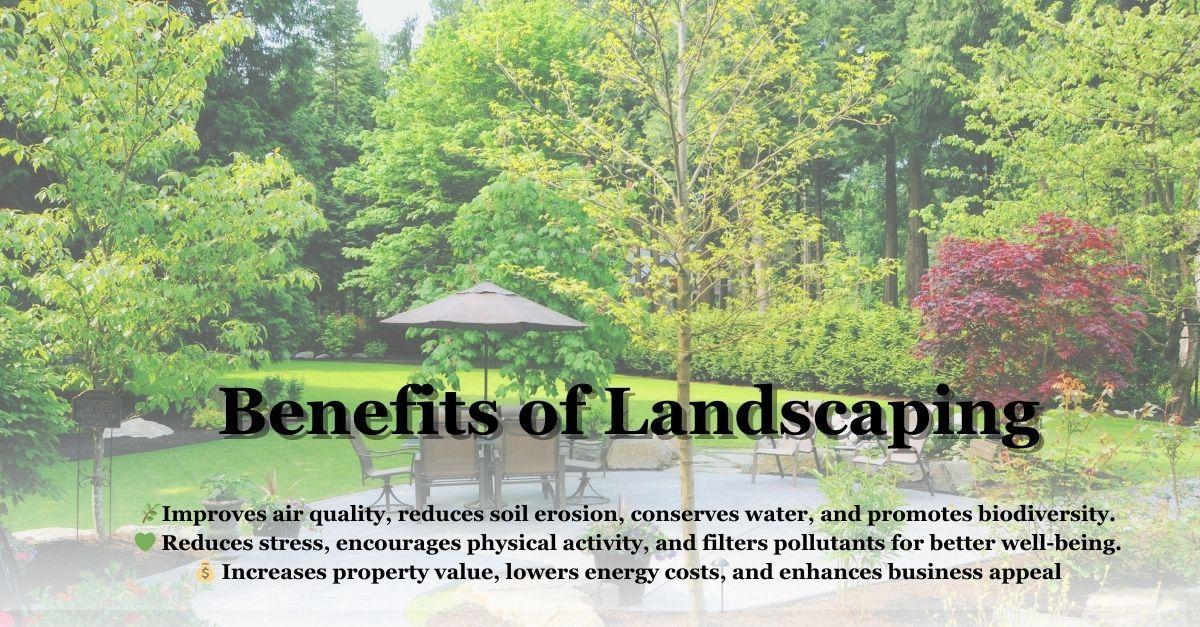Landscaping is a crucial element in enhancing the aesthetic appeal, functionality, and sustainability of outdoor environments. Whether for residential or commercial properties, a well-executed landscape design provides far-reaching advantages beyond mere visual enhancement. The benefits of landscaping extend to environmental conservation, improved air quality, and energy efficiency, making it an essential investment for property owners.
Strategically planned landscapes not only contribute to property value appreciation but also foster biodiversity and promote ecological balance. Additionally, incorporating native plants in landscaping reduces maintenance costs and conserves water, reinforcing the environmental benefits of landscaping. Regular landscape maintenance ensures longevity and optimal performance, preventing deterioration and preserving curb appeal.
Engaging a professional landscaping company streamlines the design, installation, and upkeep processes, ensuring sustainable, high-quality outcomes. This blog explores the health benefits of landscaping, the advantages of native plants, and the essential role of professional landscapers in creating and maintaining beautiful, functional landscapes.
What is Landscaping?
Landscaping is the process of modifying outdoor spaces to enhance their appearance, usability, and environmental impact. It involves various elements that contribute to the overall functionality and beauty of an area.
- Improves Aesthetics and Usability: Landscaping transforms spaces by incorporating trees, shrubs, flowers, and greenery, creating visually appealing environments.
- Includes Hardscape Elements: Features like patios, pathways, and retaining walls add structure and functionality to outdoor areas.
- Ensures Proper Irrigation and Maintenance: Well-planned irrigation systems and regular upkeep maintain the health and sustainability of landscapes.
- Provides Environmental Benefits: Thoughtful landscape design helps improve air quality, reduce noise pollution, and promote biodiversity.
- Offers Psychological and Economic Advantages: A well-maintained landscape contributes to mental well-being, increases property value, and supports sustainable living.
- Creates Recreational Spaces: Professionally designed landscapes offer outdoor spaces for relaxation, socializing, and physical activities.
A well-planned landscape design delivers more than just visual appeal, it plays a crucial role in enhancing sustainability, improving quality of life, and increasing property value.
What Are the Benefits of Landscaping?
Landscaping offers a variety of environmental, health, and economic benefits that contribute to a sustainable and functional outdoor space. Whether for residential or commercial properties, investing in professional landscape design can transform an ordinary space into a valuable asset.
Environmental Benefits
- Improves Air Quality: Plants and trees act as natural air purifiers, absorbing carbon dioxide and releasing oxygen. They also help filter pollutants and dust, ensuring cleaner air.
- Reduces Soil Erosion: Proper landscape design prevents soil erosion by using grass, shrubs, and tree roots to stabilize the ground, protecting against water runoff and degradation.
- Enhances Water Conservation: Incorporating drought-resistant plants and efficient irrigation systems reduces unnecessary water consumption, making landscaping eco-friendly and sustainable.
- Promotes Biodiversity: A well-planned landscape design encourages biodiversity by creating habitats for birds, bees, butterflies, and other wildlife, promoting ecological balance.
Health Benefits
- Reduces Stress and Enhances Well-being: Green spaces create a tranquil environment, reducing stress, anxiety, and mental fatigue. Spending time in nature has been linked to improved mood and relaxation.
- Encourages Physical Activity: Landscaped gardens and parks encourage outdoor activities like walking, jogging, and gardening, which contribute to overall fitness and well-being.
- Filters Pollutants: Trees and plants absorb toxins from the air, helping to reduce harmful pollutants like dust, smoke, and allergens, contributing to better respiratory health.
Economic Benefits
- Increases Property Value: Well-maintained landscapes enhance curb appeal, making properties more attractive to buyers and increasing real estate value. Homes and commercial properties with beautiful landscaping sell faster and at higher prices.
- Lower Energy Costs: Strategic landscape design with trees and shrubs provides natural shade, reducing the need for air conditioning in summer. Windbreaks also help insulate properties during winter, cutting heating expenses.
- Enhances Business Appeal: For commercial properties, professional landscaping creates a welcoming atmosphere, attracting more customers, improving employee morale, and increasing overall business profitability.
What is the Benefit of Landscaping Native Plants?
Native plants are a key component of sustainable landscaping, offering multiple benefits that enhance environmental health, reduce maintenance costs, and increase property value.
- Low Maintenance: Native plants are naturally adapted to local climate and soil conditions, requiring minimal watering, fertilization, and pest control. This reduces long-term maintenance costs and supports a sustainable landscape.
- Supports Local Wildlife: These plants provide essential food sources and shelter for native birds, bees, and butterflies, contributing to local biodiversity. A thriving ecosystem enhances the natural balance and resilience of your landscape.
- Adaptability: Native plants are more resistant to local weather conditions, pests, and diseases, reducing the risk of plant loss. Their ability to thrive without excessive care makes them a reliable and long-lasting landscaping choice.
- Water Efficiency: Unlike exotic species, native plants have deep root systems that improve soil health and reduce water runoff. By requiring less irrigation, they promote water conservation and lower utility bills.
Integrating native plants into your landscaping strategy not only enhances aesthetic appeal but also improves sustainability, making it a smart investment for property owners.
What Are the Advantages of Landscape Maintenance?
Regular landscape maintenance is important for preserving the beauty, functionality, and sustainability of outdoor spaces. Whether for residential or commercial properties, a well-maintained landscape provides a range of benefits that enhance property value and environmental health.
Prevents Overgrowth
Routine trimming, pruning, and weeding are crucial for preventing overgrowth and maintaining the structural integrity of plants. Overgrown trees and shrubs can block sunlight, hinder plant growth, and create safety hazards. Regular landscape maintenance ensures that plants receive adequate air circulation and sunlight, promoting their long-term health and vitality. Additionally, well-kept green spaces contribute to the overall health benefits of landscaping by reducing allergens and enhancing air quality.
Improves Curb Appeal
A professionally maintained landscape significantly boosts the visual appeal of any property. Neatly trimmed lawns, vibrant flower beds, and well-defined pathways create an inviting and aesthetically pleasing environment. For homeowners, this can lead to increased property value, making the property more attractive to potential buyers. In commercial settings, an attractive landscape enhances business appeal, improving customer impressions and employee satisfaction. The benefits of landscape design also contribute to creating a cohesive and well-planned outdoor aesthetic.
Protects Against Pests
Regular inspections and proper care help identify and address pest infestations and plant diseases before they become severe. Well-maintained landscapes discourage pest breeding grounds by eliminating standing water, decaying plants, and excessive debris. Implementing sustainable pest control measures further enhances the environmental benefits of landscaping, ensuring a healthier and eco-friendly outdoor space.
Saves Long-Term Costs
Investing in regular landscape maintenance reduces the likelihood of costly repairs and extensive overhauls. Addressing minor landscaping issues early prevents larger problems, such as dying trees, eroded soil, and damaged irrigation systems. Additionally, maintaining a well-balanced landscape with native plants reduces water consumption, contributing to the environmental benefits of landscaping while cutting down on utility expenses.
Supports Energy Efficiency
A strategically maintained landscape can contribute to energy savings by providing natural cooling and insulation. Properly placed trees and shrubs act as windbreaks in colder months, reducing heating costs, while shaded areas lower air conditioning expenses in summer. This sustainable approach aligns with the benefits of landscaping by improving environmental efficiency and property sustainability.
Hiring professional landscaping companies can help achieve these advantages efficiently, ensuring the landscape remains healthy, functional, and visually appealing throughout the year.
What Do Landscaping Companies Do?
Professional landscaping companies provide a range of services to enhance, design, and maintain outdoor spaces. Their expertise ensures that landscapes remain functional, aesthetically pleasing, and environmentally sustainable.
Landscape Design and Installation
Landscaping companies create customized landscape designs that align with the property’s architecture, climate, and functionality. They incorporate elements such as native plants, water-efficient irrigation, and strategic hardscaping to enhance the benefits of landscape design while ensuring long-term sustainability.
Lawn and Garden Maintenance
Regular maintenance is crucial for preserving the health benefits of landscaping and keeping lawns lush and green. Professional services include mowing, aeration, fertilization, weed control, and pest management to ensure a vibrant, disease-free lawn that enhances curb appeal.
Hardscaping Services
Landscaping companies install functional and aesthetic hardscape elements such as patios, pathways, retaining walls, and outdoor water features. These structures improve usability, increase property value, and complement the environmental benefits of landscaping by enhancing soil stability and reducing water runoff.
Tree and Shrub Care
Professional landscapers provide expert tree and shrub care, including pruning, disease treatment, and removal when necessary. Well-maintained trees improve air quality, offer shade for cooling, and support local biodiversity, maximizing both the benefits of landscaping and property safety.
Sustainable Landscaping Solutions
Many landscaping companies specialize in eco-friendly landscape solutions, incorporating native plants, rain gardens, and permeable paving to conserve water and reduce environmental impact. These sustainable practices contribute to the environmental benefits of landscaping, creating landscapes that require minimal resources while supporting local ecosystems.
Final words
Investing in professional landscaping offers multiple advantages, from increasing property value to enhancing environmental sustainability. A well-planned landscape not only improves curb appeal but also provides significant health benefits of landscaping, such as reducing stress and improving air quality. Additionally, the environmental benefits of landscaping include preventing soil erosion, conserving water, and supporting local wildlife.
By combining the benefits of landscape design and ensuring regular maintenance, you can create a visually appealing and functional outdoor space. To achieve the best results, hiring expert landscaping companies ensures high-quality work, customized solutions, and long-term sustainability. Whether for residential or commercial properties, professional landscaping enhances aesthetics, efficiency, and overall well-being.



Recent Comments